牛津英语3--6年级重点句型、语法归纳
牛津英语六年级知识点总结
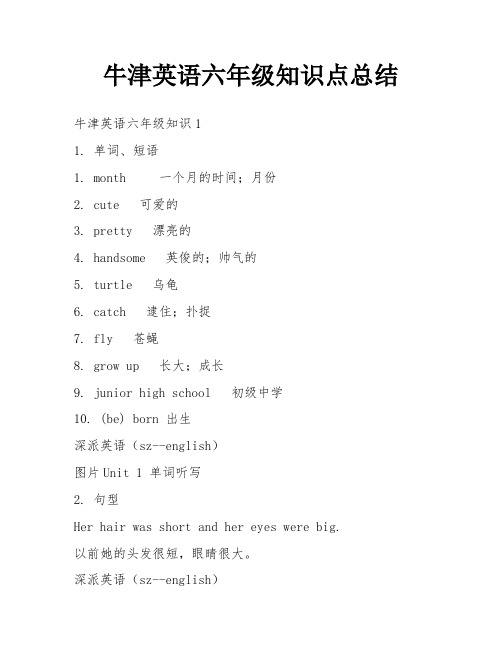
牛津英语六年级知识点总结牛津英语六年级知识11. 单词、短语1. month 一个月的时间;月份2. cute 可爱的3. pretty 漂亮的4. handsome 英俊的;帅气的5. turtle 乌龟6. catch 逮住;扑捉7. fly 苍蝇8. grow up 长大;成长9. junior high school 初级中学10. (be) born 出生深派英语(sz--english)图片Unit 1 单词听写2. 句型Her hair was short and her eyes were big.以前她的头发很短,眼睛很大。
深派英语(sz--english)图片Unit 1 Lisen and say 听写图片Unit 1 Read a story 听写3. 重难点1.一般过去时表示过去某个时间里发生的动作,常和表示过去的时间状语连用,如:yesterday,last night,this morning,in 1990,ago,since 1999,last(week,year,night,month...)等。
2.过去式顺口溜动词一般过去时,表示过去发生的事;一般动词加ed,若是特殊得硬记;be 用was 或用were,have,has变had;谓语动词过去式,过去时间做标志;否定句很简单,主语之后didn't添;疑问句也不难,did放在主语前。
牛津英语六年级知识21. 单词、短语1. famous 著名的;出名的2. during 在......期间3. spend 度过4. everyone 每个人;所有人5. countryside 乡村;农村6. pick 采摘7. summer holiday 暑假深派英语(sz--english)图片Unit 2 单词听写2. 句型1. How was your summer holiday?你的暑假过得怎样?2. It was wonderful!We went to the Great Wall.非常棒!我们去了长城。
小学牛津英语语法大全精心整理版
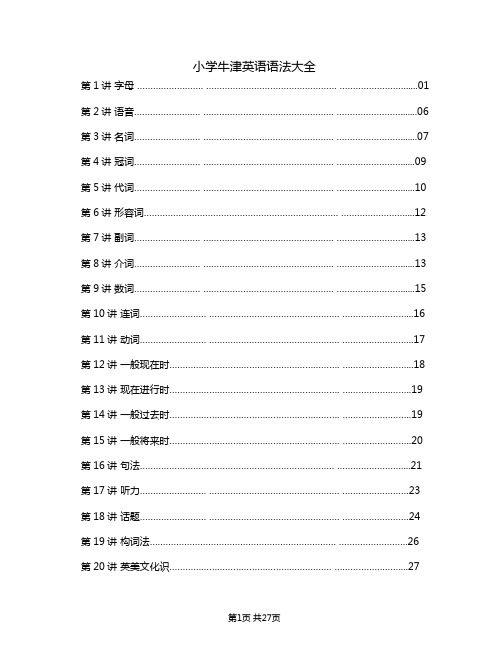
小学牛津英语语法大全第1讲字母......................... ................................................. (01)第2讲语音......................... ................................................. . (06)第3讲名词......................... ................................................. . (07)第4讲冠词......................... ................................................. (09)第5讲代词......................... ................................................. (10)第6讲形容词......................................................................... . (12)第7讲副词......................... ................................................. (13)第8讲介词......................... ................................................. (13)第9讲数词......................... ................................................. (15)第10讲连词......................... ................................................. (16)第11讲动词......................... ................................................. (17)第12讲一般现在时................................................................ (18)第13讲现在进行时................................................................ .. (19)第14讲一般过去时................................................................ .. (19)第15讲一般将来时................................................................ .. (20)第16讲句法......................................................................... . (21)第17讲听力......................... ................................................. . (23)第18讲话题......................... ................................................. . (24)第19讲构词法...................................................................... .. (26)第20讲英美文化识............................................................. . (27)第1讲字母1. 英语中共有26个字母。
牛津上海版英语六年级上册Unit6知识点及语法点
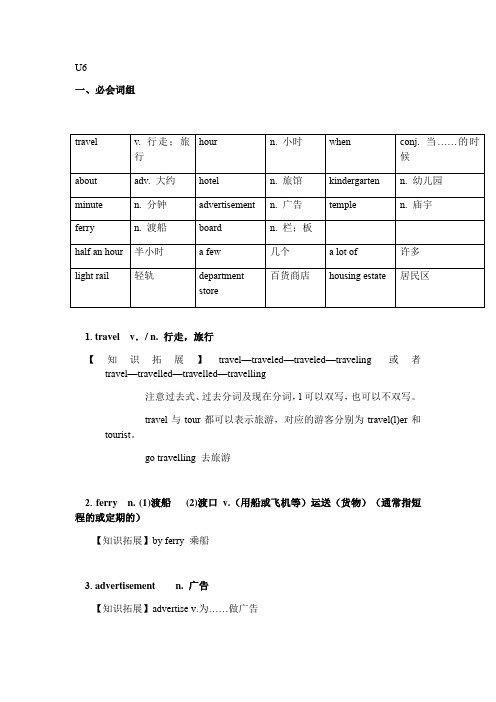
U6一、必会词组1. travel v./ n. 行走,旅行【知识拓展】travel—traveled—traveled—traveling或者travel—travelled—travelled—travelling注意过去式、过去分词及现在分词,l可以双写,也可以不双写。
travel与tour都可以表示旅游,对应的游客分别为travel(l)er和tourist。
go travelling 去旅游2. ferry n. (1)渡船(2)渡口v.(用船或飞机等)运送(货物)(通常指短程的或定期的)【知识拓展】by ferry 乘船3. advertisement n. 广告【知识拓展】advertise v.为……做广告4. board n. 栏;板【知识拓展】abroad adv. 在国外,到国外。
broad adj. 宽广的。
形象记忆board这个单词:首尾bd两个字母想象成船头和船尾,中间oar是一个单词,意思是“桨”,所以board有“甲板,上船”的意思。
5. a few 几个。
a few只能修饰可数名词复数形式,与之对应的是a little, 只能修饰不可数名词。
练习:I.Read and complete the sentences.(根据给出的首字母,完成句子。
)1. I have been to Jing’an T .It's in the centre of Shanghai.2. My father’s office is far away from home. He goes to work by l r every morning because it is fast.3. Mum likes going to some department s at weekends.4. We live in a new h e . It's large and beautiful.keys: 1.Temple 2.1ight rail 3.stores 4.housing estate 【乘坐交通方式表达】乘坐交通工具的表达:by bus/by car/by underground/by bike/by plane/by ferry /on foot乘公共汽车/乘小汽车/乘地铁/骑自行车/乘飞机/乘轮渡/步行。
“牛津上海版”小学英语三年级(下)知识点大全
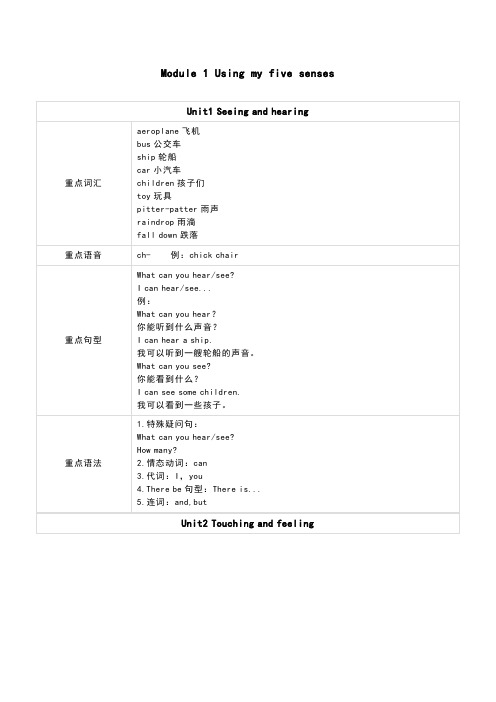
Do you like...? Yes,I do./No,I don’t. 例: Do you like elephants? 你喜欢大象吗? Yes,I do. 是的,我喜欢。 Do you like tigers? 你喜欢老虎吗? No,I don’t. 不,我不喜欢。
I have... My...is/are... 例:I have two eyes.My eyes are big. 我有两个眼睛。我的眼睛大。
Of course.当然。
1.动词 have:I have... 2.一般疑问句:Can you...? 3.Be 动词: These are... They are... 4.代 词 : my,me,myself,yourself
May I have a try? Sure. 我能试下吗?当然。
1.特殊疑问句: What is it? What’s this/that? What are these/those? 2.一般疑问句: Are they...? 3.Be 动词:It's/They're...
重点词汇 重点语音
重点句型
补充句型 重点语法
Module3 Things around us
Unit1 Shapes
circle 圆形 square 正方形 triangle 三角形 star 星形 rectangle 长方形
-ff 例:turn off take off
What shape is it? 它是什么形状的? It’s a circle. 它是一个圆形。
重点语法
1. 祈 使 句 : 动 词 原 形 开 头 例:Close your eyes./Smell this. 2. 特 殊 疑 问 句 : How does it smell/taste? What is it? 3.一般疑问句:Is it...? 4.Be 动词:It's...
新牛津译林版小学英语三年级上册知识点归纳总结 17页(喜子的商铺)
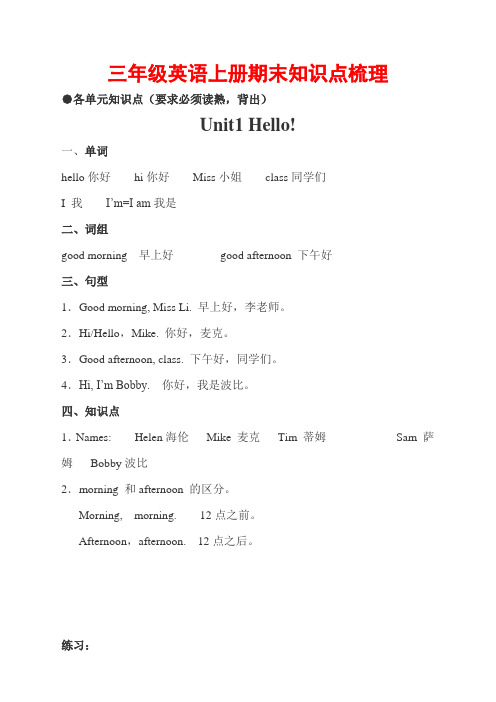
三年级英语上册期末知识点梳理●各单元知识点(要求必须读熟,背出)Unit1 Hello!一、单词hello你好hi你好Miss小姐class同学们I 我I’m=I am我是二、词组good morning 早上好good afternoon 下午好三、句型1.Good morning, Miss Li. 早上好,李老师。
2.Hi/Hello,Mike. 你好,麦克。
3.Good afternoon, class. 下午好,同学们。
4.Hi, I’m Bobby. 你好,我是波比。
四、知识点1.Names: Helen海伦Mike 麦克Tim 蒂姆Sam 萨姆Bobby波比2.morning 和afternoon 的区分。
Morning, morning. 12点之前。
Afternoon,afternoon. 12点之后。
练习:一、根据情境选择合适的句子。
1.()当你看到新朋友,想打招呼时,可以说:A.What’s you r name? B. Hello. Nice to meet you. C. Goodbye.2. ()早上起床,对准备早餐的妈妈说:A.Good morning. B. Good afternoon. C. Good evening.3. ()下午老师进班上课,对同学们说:A.Good morning, class. B. Good afternoon, class. C. Good evening, class.4. ()当你介绍自己是迈克时,你说:A. Hello, Mike.B. Hi, I’m Helen.C. Hi, my name is Mike.二、连词成句。
1. hi, I’m,Bobby (.) ___________________________________2. morning, Mike, good (, .)___________________________________Unit2 I’m Liu Tao一、单词are是am是you 你yes是no 不not不goodbye再见二、句型1. Are you Su Hai? Yes, I am./ No, I’m not.你是苏海吗?是的,我是。
牛津上海版英语六年级上册Unit5知识点及语法点

牛津上海版英语六年级上册Unit5知识点及语法点一、词汇部分咱先来说说Unit5 的重点词汇哈。
“airport”,发音是[ˈeəpɔːt],拼写就是a-i-r-p-o-r-t,中文意思是“机场”。
常用搭配有“at the airport”,比如说“He is waiting at the airport.”他在机场等着呢。
“relative”,发音[ˈrelətɪv],拼写r-e-l-a-t-i-v-e,意思是“亲戚”。
“visit relatives”去拜访亲戚。
“We often visit relatives during holidays.”我们经常在假期去拜访亲戚。
“photo album”,发音[ˈfəʊtəʊ ˈælbəm],拼写p-h-o-t-o a-l-b-u-m,意思是“相册”。
“I put my photos in a photo album.”我把我的照片放在相册里。
“during”,发音[ˈdjʊərɪŋ],拼写d-u-r-i-n-g,意思是“在……期间”。
“I read books during the summer vacation.”我在暑假期间读书。
“stay”,发音[steɪ],拼写s-t-a-y,意思是“停留”。
“I stay at home on weekends.”我周末待在家里。
“grandparent”,发音[ˈɡrænpeərənt],拼写g-r-a-n-d-p-a-r-e-n-t,意思是“(外)祖父母”。
“I love my grandparents.”我爱我的(外)祖父母。
“clothes”,发音[kləʊðz],拼写c-l-o-t-h-e-s,意思是“衣服”。
“I have many beautiful clothes.”我有很多漂亮的衣服。
“pack”,发音[pæk],拼写p-a-c-k,意思是“打包”。
译林牛津版六年级知识点整理

精心整理知识点归纳班级:姓名:句子时态归纳一、一般现在时(句子中通常有always,usually,often,sometimes,never,every…,onMondays/…)1、句型结构:主语+V.(s)如果主语是三单,谓语动词加s或者es.2(1(2(3(412(1(2(3put—12(1(2e.g.stop–stopped,shop–shopped(3)原形与过去式同型e.g.read-read,hit-hit,put-put,let-let,cut-cut,lose—lost(4)以辅音+y结尾去y变i+ede.g.copy-copied,cry-cried,study-studied,become-became(5谓语动词结构是:begoingto+do(表示计划、打算做…)或者will+do(表示即将发生…)句型结构:主语+begoingto/will+V.原形’t后面,(试着动词如:help(helpme)/let(letus)/make(you)…介词如:for(me)/from(him)/to(you)…名词使用1、alotof,lotsof,some,afew,many,howmany后面加可数名词复数,alotof,lotsof,some,alittle,much,howmuch后面加不可数名词。
(1)一般情况,+s(2)名词以s、x、sh、ch结尾,+es(3)名词以“o”结尾,有生命的+es(如potato—potatoes);无生命的+s(如photo—photos)(4)名词以“y”结尾,元音(a,e,i,o,u)+y结尾——直接+s;辅音+y结尾——去y变i+es(5)名词以“f”/“fe”结尾,去f/fe变ve+s(61.2.3.12、3、-ist结尾:piano---pianist,science---scientist,art---artist,牙医dentist4、-man结尾:post---postman,milk---milkman,space---spaceman,fire---fireman___5、男/女职业:police---policeman(男),police---policewoman(女)act---actor(男),act---actress(女)wait---waiter(男),wait---waitress(女)6、医生doctor,护士nurse,农民farmer,宇航员astronaut7、China中国-Chinese中国人America美国-American美国人France法国-French法国人theUK英国-British英国人England英国-English英国人Australia澳大利亚-Australian澳大利亚人Japan日本-Japanese日本人theUS/America美国-American美国人句型转化一、一般疑问句做法:(1)有Be动词(am\is\are\was\were)时,将Be动词提到句首,剩余部分照抄;(2)有情态动词can/would/must/will/should时,将can/would/must/will/should提到句首,剩余部分照抄;(3词(4(1(2)didn’t.(1、It’e.g.It’2、3、4、5、6、7、8、e.g.Wheredoyoucomefrom?=Whereareyoufrom?IcomefromChina.=IamfromChina.9.What+名词短语!=How+形容词+名词!e.g.Whatanicebook!=Hownicethebookis!10.begoodat=dowellineg:I’mgoodatplayingbasketball.=Idowellinplayingbasketball.11.lookafter=takecareofEg:Youshouldlookafteryourlittlesister.=Youshouldtakecareofyourlittlesister.12.Hewalkstoschooleveryday.=Hegoestoschoolonfooteveryday.几点补充说明1、excited用来形容人,exciting用来形容事物,excitedly用来形容人的动作。
六年级上册英语沪教牛津版知识要点

Module1Getting to know each other一、核心词汇1.表示时间名词:month一个月的时间;月份yesterday昨天2.形容词:cute可爱的pretty漂亮的handsome英俊的;帅气的famous著名的;出名的healthy健康的;有益于健康的unhealthy不健康的;损害健康的3.动词:catch逮住;捕捉spend度过pick采摘4.食物名词:hamburger汉堡包fruit水果pie馅饼pizza比萨饼cola可乐sandwich三明治vegetable蔬菜chicken鸡肉chocolate巧克力5.表示动物名词:turtle乌龟fly苍蝇6.其他:during在……期间everyone每个人;所有人countryside乡村;农村7.核心词组:grow up长大;成长junior high school初级中学(be)born出生summer holiday暑假the Great Wall长城the Palace Museum故宫博物院Tian’an men Square天安门广场go swimming去游泳go to the museum去博物馆go to the cinema去电影院junior high school初级中学do my homework做我的家庭作业watch TV看电视visit my friends拜访我的朋友a little少量的fish and chips炸鱼薯条二、了解词汇1.一些动词及过去式:go(去)—went do(做)—didhave/has(有)—had watch(观看)—watchedvisit(访问;探望)—visited am/is(是)—was are(是)—were2.一些食物名词:egg鸡蛋bread面包noodles面条dumplings饺子3.其他:menu菜单三、核心句型1.Her hair was short and her eyes were big.她那时头发很短而且眼睛很大。
- 1、下载文档前请自行甄别文档内容的完整性,平台不提供额外的编辑、内容补充、找答案等附加服务。
- 2、"仅部分预览"的文档,不可在线预览部分如存在完整性等问题,可反馈申请退款(可完整预览的文档不适用该条件!)。
- 3、如文档侵犯您的权益,请联系客服反馈,我们会尽快为您处理(人工客服工作时间:9:00-18:30)。
牛津英语3-6年级重点句型、时态及疑问词的用法一、重点句型:3A1.Hi /Hello /Good moring.2.Goodbye./See you.3.How are you? Fine, thanks.4.What’s your name? I’m Danny.5.Clean the blackboard, please. Thank you.6.Is it a book? Yes, it is. / No, it isn’t.7.This is a butterfly. That is a tree.8.What’s this/ that? It’s a bee.9.Is this/ that a classroom? Yes, it is./ No, it isn’t.10.I’m a girl. I’m nine. I’m tall.11.Who’s he/she? He/She’s…12.A cake, Ben? Yes, please. / No, thank you.13.Eight ice-creams, please. Here you are.14.What shape is it? It’s a triangle.15.What colour is the mountain/ are the clouds? It’s/ They’re…16.What are they? They’re pigs.17.How many Cokes? Three Cokes.18.It has a head and body.3B1.What can you see/ hear? I can see/ hear a/ an…2.What’s that noise? It’s a lorry.3.Touch this. How does it feel? It’s hard.4.Taste this. What is it? It’s sour. It’s a lemon.5.I like monkeys. I don’t like snakes.6.Do you like pandas? Yes, I do. / No, I don’t.7.How old are you? I am nine.8.How old is Ben/ Alice? He’s/ She’s…9.What’s his/ her name? His/ Her name is…10.I have two new friends. Ben has a dog.11.She has a red and white dress.12.What season is it? It’s summer.13.It’s warm. It’s not cold.4A1.This is our classmate. His/Her name’s…2.She can fly. But she can’t cook.3.What can you do? I can fly an aeroplane.4.Can you draw? Yes, I can. / No, I can’t.5.Can he/ she dive? Yes, he/ she can. / No, he/she can’t.6.What do you do? I’m a teacher.7.What does your father/ mother do? He’s/ She’s a/ an…8.Happy birthday! Thank you.9.You can call me Alice.10.My face is round. My eyes are big.11.Are you hungry? Yes, I am. / No, I’m not.12.I have a new bicycle. I’m happy.13.Nice to meet you.14.Ben likes dogs. But he doesn’t like cats.15.Whose ball is this? It’s Ben’s ball.16.Whose pens are these? They’re Betty’s pens.17.How much is it? It’s six yuan.18.What have you got? I’ve got some bread and some milk.19.Where are the birds? They’re in the aviary.20.Don’t feed the birds.21.Here’s some hay.22.What do hens like? They like corn.23.Its stalk is long. Its leaves are green.24.Has it got s big trunk? Yes, it has. / No. it hasn’t.25.I’m sorry. That’s all right.4B1.These/ Those crayons are old.2.What time is it? It’s seven o’clock.3.What’s the weather like in January? In January, it’s cloudy, windy and cold.4.There are four seasons in a year.5.How many balls are there? There is one ball.6.Have you got a pet? Yes, I have. /No, I haven’t.7.What’s its name? Its name’s Peter.8.What are you doing? I’m reading.9.Put the tail on the donkey.10.I live in Shanghai.11.The bench is between the table and the tree.5A1.Look! The traffic light’s red. Stop!2.Can I go out? Yes, you can. / No, you can’t.3.What do you want? I want some glue.4.What do you need for school? I need a new uniform.5.Let’s make a cake.6.What time do you go to school? I go to school at seven o’clock.7.Ben does his homework at half past seven.8.What do you like? What don’t you like? I like cabbage, but I don’t like carrots.9.How are you today? I’m sick today.10.Is Danny hungry or thirsty? He’s thirsty.11.Which bicycle do you like? I like the grey one.12.When’s your birthday? My birthday’s on the tenth of September.13.How do you go to school? I walk to school.14.Does Ben walk to school? Yes, he does. / No, he doesn’t.15.How do you spell that in English? C-O-C-O-O-N, cocoon.16.The Li River is in Guilin. Sanya is on Hainan Island.5B1.Have you got any bananas? Yes, I’ve got some bananas.2.Do you want both biscuits? No, I want the big/ small one. / Yes, I want both.3.Give me a hammer, please.4.Thank you. You’re welcome.5.Whose book is this? It’s mine.6.I listen and hear with my ears.7.Are they the same or different? They are the same/ different.8.How much hay do the elephants eat? They eat 50 kilos of hay.9.Excuse me. Where are the tigers? Go down the steps. Walk along Zoo Road. The tigers are on the left.10.Which doll do you like? I like all the dolls.11.What colour are the pandas? Both/ All the pandas are black and white.12.The picture was beside the window. Where is it now? It’s beside the mirror now.13.Ben went to the park.14.Ben and Kitty were at home.15.Did you like the loud music? Yes, I did. / No, I didn’t.16.What time is it? It’s five past/ to five.6A1.What do you do with your aunt? I always/ usually/ sometimes play game with my aunt.2.She is never naughty.3.They like to play together.4.Have you been to Ocean Park yet? Yes, I have just/ already been there.5.Where are we going to come back? We are going to come back at six o’clock.6.I will arrive at two o’clock.7.Would you like to be a policeman? Yes, I would. / No, I wouldn’t.8.What would you like to be? I’d like to be a postman.9.How long does it take you to get there? It takes me about half an hour.10.What does this sign mean? We must listen to our teacher.11.Shall we buy some oranges? Yes, I like/ No, I don’t like oranges.12.What would you like? I’d like some bread.13.Would you like some chicken wings? Yes, please. / No, thanks.14.May I have some pears, please? OK. Here you are.15.Your diet is healthier than / as healthy as my diet.6B1.How far is it from Shanghai to Beijing? It’s about 1,400 kilometres.2.Many tourists like/ love/ enjoy eating spicy food.3.I’d rather have a piece of pizza.4.I like salty rice dumplings with/ without meat.5.What’s your favourite indoor/ indoor activity? I like doing puzzles at home/ playing football in theplayground.6.What should I do? You should watch less television/ wear more clothes.7.What will Jim possibly be in 15 years’ time? She will possibly be a singer.8.I’m good/ poor at Chinese.二、主要时态1.一般现在时1)be动词与人称的搭配:我是am,你是are,is跟着他她它,are也跟着我们,你们和他们。
